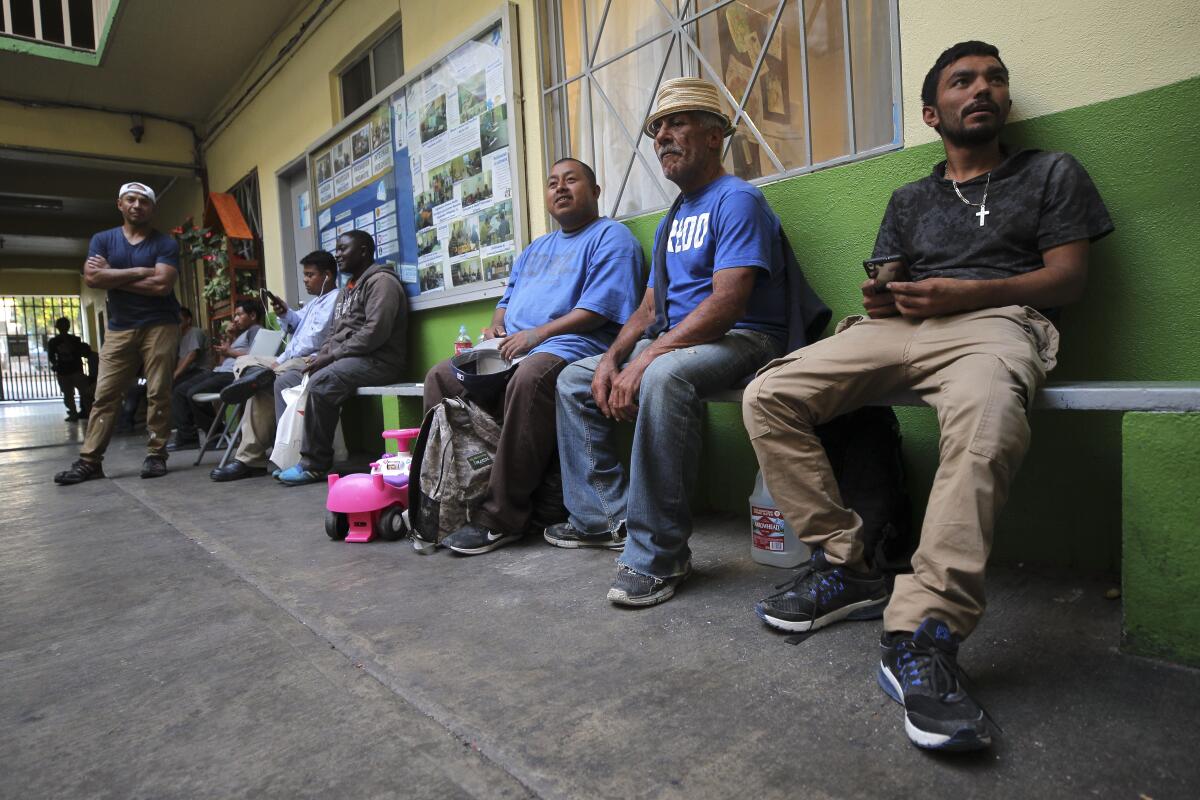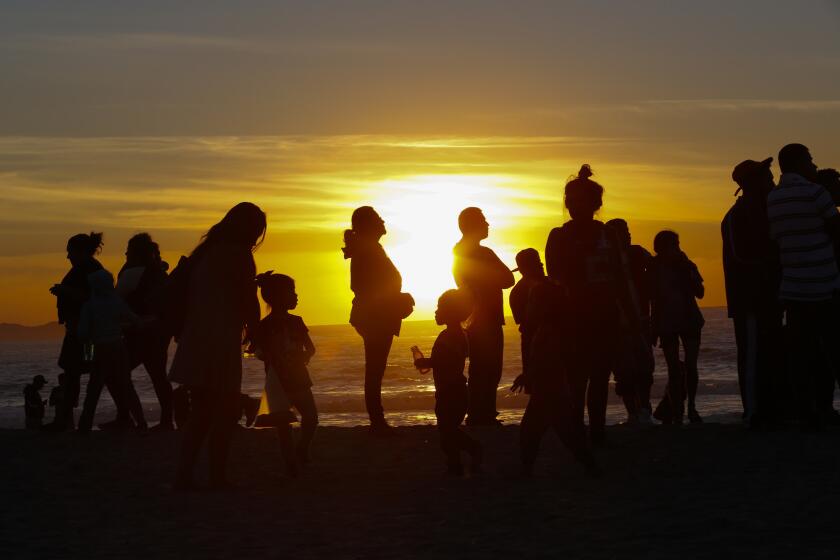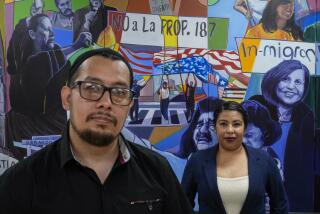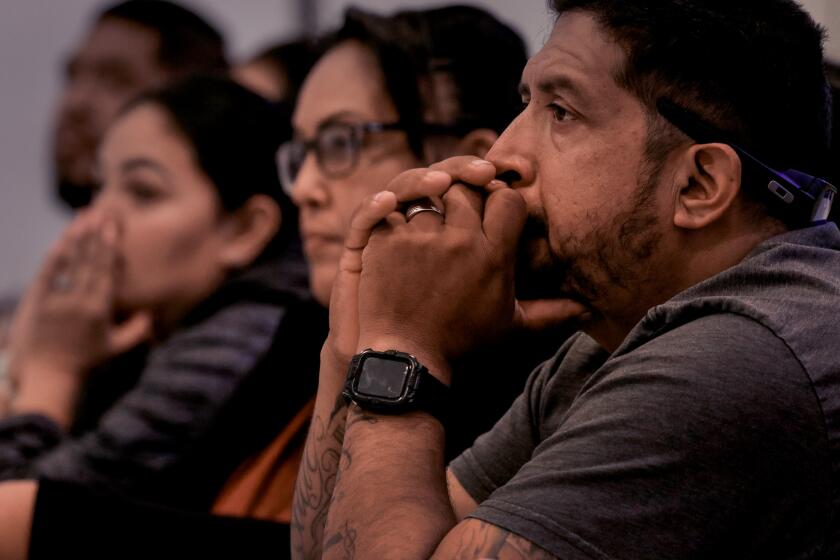Trapped in Mexico, asylum seekers hope Biden will let them enter U.S.

Tijuana’s El Chaparral plaza, a nexus in the western pedestrian route between San Diego and its southern neighbor, once bustled with activity at 7 a.m. on a Monday. Street vendors would sell breakfast and local newspapers to workers heading north for their shifts.
There, too, each morning, asylum seekers from across the globe would gather to wait for their numbers to be called from a notebook to begin the process of requesting protection. Others would queue up to be taken temporarily across the border to their court hearings.
Today the throngs of people are gone, chased away by a pandemic and U.S. government policy hostile to asylum seekers.
But now that President Biden is in the White House, hope is growing in Tijuana.
With it comes an urgent pressure from asylum seekers that Biden keep his campaign promises and begin allowing them into the United States.
The U.S. has always resisted protecting refugees at its border. The incoming Biden administration will have to decide whether to break with that past.
Thousands of asylum seekers have been stuck in the border city for months, and in some cases years, because of restrictive policies from the Trump administration.
Some were returned to Tijuana through the “Remain in Mexico” program, which requires them to wait south of the border while their U.S. immigration court cases progress. Those cases have been paused since the pandemic began.
Others signed up on a de facto wait list in a notebook managed by migrants and Mexican immigration officials because of a policy called “metering” that restricts how many asylum seekers U.S. ports of entry will process each day. Still others haven’t even been able to sign up for a place in line because the notebook has been shut down since a pandemic order stopped asylum processing altogether.
“We have hope that this new government that is Joe Biden and Kamala Harris will bring us help and support to keep going forward,” said an asylum seeker from Guatemala who asked to not be identified because of dangers he is still facing. “The previous government left us abandoned here.”
The Biden team is expected to unveil some immigration policy proposals as soon as Wednesday, but it was unclear yet whether these would include asylum processing changes.

Last week, El Chaparral plaza was quiet and empty, except for a couple of taxi drivers and one family from the southern state of Guerrero that had just arrived in Tijuana to seek help and was huddled together under a blanket.
Though the eastern crossing still bustles with essential workers waiting in lines that reach two-hour wait times, the western pedestrian crossing at the San Ysidro Port of Entry has been closed for months.
And the daily queue of asylum seekers has disappeared.
Paulina Olvera Cáñez, director of the Tijuana shelter Espacio Migrante, blames both the United States and Mexico for the situation asylum seekers in Tijuana are now facing.
“There was a total abandonment by both governments,” she said. “The pandemic has been really hard for migrants. They’re living in a really precarious situation.”
Angelina, a Haitian asylum seeker, said she was returned to Mexico under the pandemic order after giving birth while in immigration custody in the United States. She didn’t know anyone in Tijuana and didn’t have anywhere to go, so she and her newborn slept on the street for several days, she said.
With Biden’s promise to restore the asylum system in mind, asylum seekers and their supporters are pushing for policy changes in the first days of his administration. On Tuesday, a group of Tijuana asylum seekers released a video congratulating Biden and Vice President Harris and asking for their help.
“We would like you to know that there are thousands of families in danger and who have been waiting at the border for over a year,” the video says. “This has been harmful and traumatizing for men, women and children.”

Asylum processing should be considered essential work while the pandemic continues, said Katerine Girón Martínez, a community organizer with Espacio Migrante. She was placed in the Remain in Mexico program, known officially as Migrant Protection Protocols, or MPP, after fleeing El Salvador.
The Mendozas, a family of Cuban asylum seekers who were placed in the program a few months ago, hope that their living nightmare might soon be over. Some of that hope comes from the presidential transition of power as well as from the legal team that is trying to help them.
They fled Cuba in 2018 because of political persecution, making a long journey through South and Central America — and getting robbed and attacked along the way — before reaching the U.S.-Mexico border, according to the father. He asked to be identified by only the family name because of the danger he is still facing in Tijuana.
The Mendozas’ son has an illness that will cause him to lose his motor skills if it’s not treated soon. The father is praying that the attorneys with Jewish Family Service will be able to help him persuade border officials to allow his family into the country as soon as this week. A few families have managed to do so recently because of serious medical needs, but it is still a rare occurrence.
“What we as parents want is for our children to be healthy, that they have a proper education, that they live and don’t suffer what we, the parents, suffered,” Mendoza said in Spanish. “We left Cuba and have tried to keep them from feeling the change but it’s almost impossible.”
He recalled, with sadness in his voice, his 7-year-old son asking him why so much had happened to the family.
“God gives us sometimes situations and paths that we have to face, and this is one of them,” Mendoza said. “I know that with his powerful hand we can get there and show this country that we work hard and follow the laws and respect them.”
For now, the family is renting a room and trying not to leave it. Mendoza is particularly worried that his children or wife could be kidnapped. Migrants are often targets, he said, and they can be sold after they are captured.
More to Read
Sign up for Essential California
The most important California stories and recommendations in your inbox every morning.
You may occasionally receive promotional content from the Los Angeles Times.












